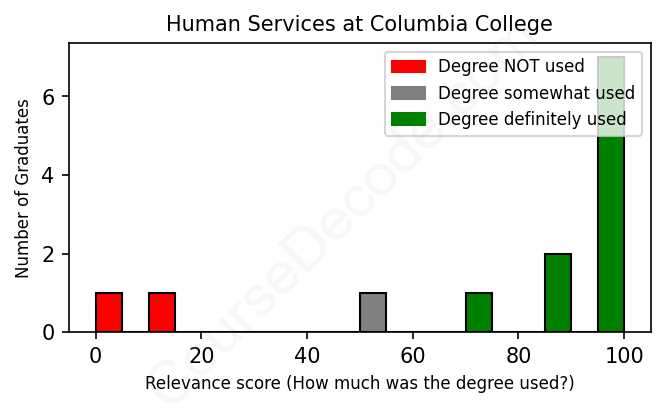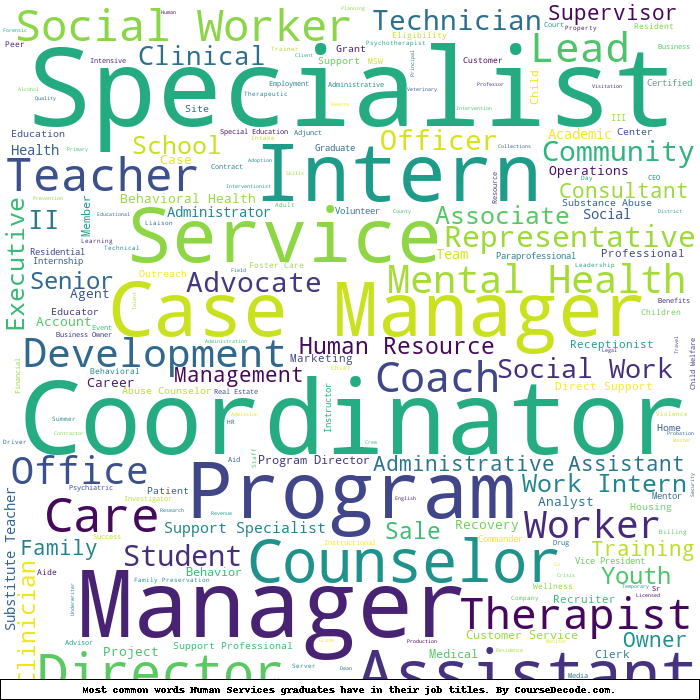
First, some facts. Of the Human Services graduates from Columbia College we've analyzed , here's how many have used (or NOT used) their degree in their career:

These are estimates based on AI analysis of 13 LinkedIn profiles (see below).
The verdict? Above average. Overall, with an average relevance score of 77%, Human Services graduates from Columbia College have a higher likelihood (+10%) of finding work in this field compared to the average graduate across all fields:
And for comparison, here's the chart for all profiles we've looked at across all degrees.
Also, after graduating, only 23% of these graduates have pursued further education other than another Bachelor's degree (such as a Masters degree or other), compared to the average across all profiles of 35%. This suggests a Bachelors degree is enough for most Human Services graduates, and it's normal to look for work straight after graduation.
See the details:
|
Relevance score: 100% We think this person has gone into a career highly relevant to their degree. We think this person has gone into a career highly relevant to their degree.
DEGREE INFOGraduated in 2023 from Columbia College with a Bachelor's degree in Human Services. No other secondary education since. JOB HISTORY SINCE GRADUATIONClient Support Coach St. Raymonds Society Apr 2023 - Present ABOUTCompass Health | Columbia, Missouri May 2021 November 2022Employment Specialist (February 2022 November 2022) Assisted clients in the Improving Community Treatment Services Outpatient Program with gainingaccess to work and community service opportunities. Coordinated education opportunities such as gaining access to the GED or Vocational Rehab Services. Network with local companies and small business to help assist them in finding gainful employees thatcame best meet the needs of there job position they have available by connecting clients to theseopportunities and advocating for them as a reference.Peer Support Specialist (May 2021 February 2022) Sharing lived experiences of recovery, sharing and supporting the use of recovery tools and modelingsuccessful recovery behaviors Assisting individuals with identifying strengths and personal resources to aid in their recovery andhelping individuals set and achieve recovery goals Participates as a member of the treatment team, giving input on client Wellness Plans and treatmentteam decisionsTurn the Page Child Care Center | Substitute Teacher March 2017 May 2021 Supervised students in the event that their regular teacher is unable to lead the class. Managed classroom behavior to ensure appropriate activities and educational learning was takingplace. Interpreted lesson plans and created reports to inform the students permanent teacher of thestudents success.VOLUNTEER EXPERIENCEVoluntary Action Center | Volunteer Spring 2018 Checked in clients to ensure they met qualifying factors to get provided services, while maintainingstrict confidentiality of the client.HONORS AND AWARDSLutheran Family and Children Services | Pregnancy and Parenting Program Certificate March 2021Lutheran Family and Children Services | Excellent Attendance Award May 2019Saint Raymonds Society | Shine Award April 2018 |
The top 10 most common jobs done by the graduates we've analyzed (ranked most common to least) are:
Based on the LinkedIn profiles of graduates from Columbia College with a degree in Human Services, it seems that a lot of them have landed jobs directly related to the field. Common roles include clinical counselors, program managers, and various support specialists. These positions typically involve working directly with people who need help, whether it's in mental health, substance abuse, or social services. For instance, jobs like Clinical Counselor and Community Support Specialist are spot on when it comes to applying the knowledge and skills learned in their Human Services programs. The hands-on experience they gain in these roles is super relevant to their degree and really puts their education to good use.
However, not every job on the list sticks close to the Human Services side of things. Some graduates have taken on roles like Executive Administrative Assistant or Revenue Management Specialist, which don't really tap into the core skills from their degrees. While those positions might use some of the interpersonal skills learned in class, they lack the direct relevance to the Human Services field. Overall, though, it seems that many of these graduates are indeed working in jobs that match well with what they studied, showing that a degree in Human Services can lead to meaningful careers helping others.
Here is a visual representation of the most common words in job titles for Human Services graduates (this is across all Human Services graduates we've analyzed, not just those who went to Columbia College):

So, looking at the career trajectories of graduates from Human Services at Columbia College, it seems like many of these folks are finding meaningful work related to their degree, especially in the social and community services sectors. Right after graduating, a lot of them kick off their careers with roles like counselors, program managers, or support specialists, which makes sense given their training. For instance, you’ve got people landing jobs as clinical counselors or eligibility workers soon after they graduate, often diving right into the heart of human services work.
Five to ten years down the line, many of these graduates move into more advanced positions like program directors, managers, or even professors. A standout example is a graduate who progressed from being a clinical counselor to becoming a Vice President of Clinical Services and then advancing to Chief Program Officer roles. Others have ventured into educational roles or consulting, which is pretty impressive. While there are some individuals who have taken paths that are a bit more tangential to their human services background, the overall trend shows that many graduates are staying within the field and making substantial contributions, which is a promising sign if you're considering this degree. It seems like a solid choice for those passionate about making an impact in social services!
Honestly, pursuing a Bachelor’s degree in Human Services can be a pretty manageable experience, especially if you have a genuine interest in helping others. At Columbia College, or really anywhere else, the coursework is typically a blend of theory and practical application, so it’s not like you’re drowning in hardcore math or science. You'll be reading, writing, and maybe doing some projects or group work, which can be more engaging than traditional lectures. It has its challenges, like any degree, especially when you're dealing with topics that require deep understanding of human behavior and social systems, but if you're motivated and passionate, you’ll likely find it to be a rewarding journey rather than a super tough grind. Overall, I’d say it’s about on par with the average college degree in terms of difficulty!
Most commonly, in the LinkedIn profiles we've looked at, it takes people 3 years to finish a Bachelor degree in Human Services.
Looking at these Human Services grads from Columbia College, it’s kind of a mixed bag when it comes to making decent money. Some of them have climbed the ladder pretty well, especially the one who went from Clinical Counselor to Vice President of Clinical Services — that sounds like a pretty solid paycheck! Others started off at entry-level positions like Eligibility Worker or Personal Aid, which typically don't pay that much. A few have made a nice living as teachers or consultants, but a lot of the roles seem tied to nonprofit or government work, which can vary widely in salary. So, while some are likely making good money now, others might still be grinding away for not-so-great paychecks, you know what I mean?
Here is a visual representation of the most common words seen in the "about" section of LinkedIn profiles who have a Bachelor degree in Human Services (this is across all Human Services graduates we've analyzed, not just those who went to Columbia College). This may or may not be useful:

Here are all colleges offering a Bachelor degree in Human Services (ordered by the average relevance score of their Human Services graduates, best to worst) where we have analyzed at least 10 of their graduates:
| College | Score | Count |
|---|---|---|
 Old Dominion University Old Dominion University
|
82 | 32 |
 Springfield College Springfield College
|
82 | 16 |
 California State University, Fullerton California State University, Fullerton
|
80 | 16 |
 Western Washington University Western Washington University
|
78 | 13 |
 Columbia College Columbia College
|
77 | 13 |
 Southern New Hampshire University Southern New Hampshire University
|
60 | 11 |
 University of Phoenix University of Phoenix
|
59 | 57 |